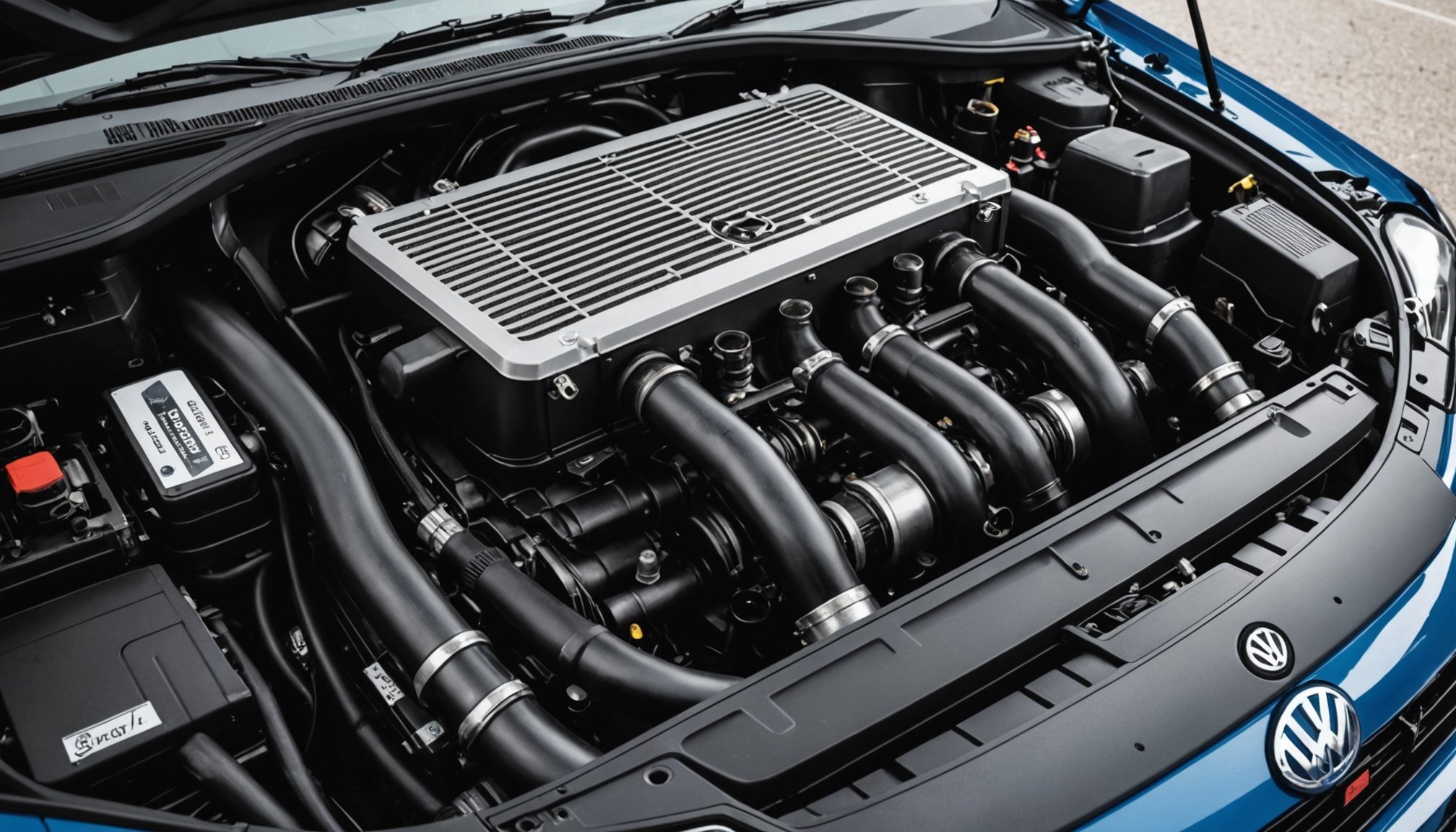Overview of Intercooler Functionality
An intercooler plays a crucial role in the cooling system of internal combustion engines by lowering the temperatures of the intake air. This process is vital because cooler air is denser and contains more oxygen, allowing for better fuel combustion. As the air passes through the intercooler, it dissipates excess heat, effectively enhancing engine performance, which translates to improved horsepower and torque outputs.
In an internal combustion engine, the temperature of intake air naturally increases due to the compression process in the turbocharger or supercharger. Without a functioning cooling system, this rise in air temperature can reduce engine efficiency, leading to less power and potential engine knock. By implementing an intercooler, the engine benefits from increased power output and efficiency as it promotes optimal combustion conditions.
In parallel : Enhance Your Ford Ranger’s Stopping Power: Discover the Benefits of Upgraded Brake Lines
The benefits of using an intercooler in a vehicle like the VW Golf GTI Mk6 underscores its importance. It not only boosts engine performance but also contributes to the vehicle’s long-term health. Intercoolers help in maintaining consistent power output over longer drives, playing a pivotal role in overcoming the thermal challenges of high-performance engines. Properly fitted intercoolers ensure the engine runs cooler and more efficiently, ultimately enhancing the driving experience.
Types of Intercoolers Available for VW Golf GTI Mk6
In the quest for improved engine performance, choosing the right intercooler can make all the difference. Two primary types dominate the market: air-to-air and air-to-water intercoolers. Each has its unique advantages for the VW Golf GTI Mk6, a vehicle celebrated for its tunability and performance potential.
This might interest you : Rev Up Your Renault Clio Sport: How Upgrading Your Exhaust Manifold Supercharges Torque
Air-to-air intercoolers rely on ambient airflow to reduce intake temperatures. Their primary benefits include a straightforward installation process, lighter weight, and lower maintenance compared to their water-based counterparts. They are a popular choice among enthusiasts who drive in cooler climates, where natural air cooling suffices.
On the other hand, air-to-water intercoolers use a water-cooling system to manage heat. They offer superior cooling efficiency and consistent performance, especially in warmer conditions. However, they come with increased complexity and potentially higher costs due to additional components like a separate radiator and pump.
For those looking to boost their GTI Mk6’s power further, aftermarket options abound. They often provide a more substantial cooling surface area and increased flow rates over stock intercoolers, enhancing the vehicle’s power and efficiency. It’s crucial to evaluate specific needs and environments when considering an upgrade, as each intercooler type brings its unique set of benefits and challenges.
Performance Gains from Intercooler Upgrades
Upgrading the intercooler on a VW Golf GTI Mk6 can lead to significant improvements in performance, particularly in horsepower (HP) and torque outputs. When assessing potential gains, it’s essential to consider comparative data revealing performance metrics both before and after installation. An effective intercooler upgrade often results in a noticeable increase in power, with some enthusiasts reporting HP gains of up to 25% under ideal conditions.
The relationship between an upgraded intercooler and performance improvement is primarily driven by enhanced cooling efficiency. By reducing the temperature of the intake air more effectively, the engine can achieve better combustion, leading to increased power output and efficiency. This enhancement also subsequently raises torque levels, allowing for better acceleration and overall vehicle responsiveness.
Owners of the VW Golf GTI Mk6 have shared overwhelmingly positive testimonials about their intercooler upgrades. Many highlight improved engine performance and satisfaction with the modifications. However, for optimal results, it’s crucial to pair an intercooler upgrade with proper tuning to ensure the engine takes full advantage of the enhanced cooling capabilities. Deciding on the right intercooler should consider driving habits and environmental conditions to maximize performance.
Installation Tips and Considerations
Installing an intercooler on your VW Golf GTI Mk6 can be a rewarding project, whether you choose a DIY approach or consult a professional. The installation process varies slightly depending on the chosen type of intercooler, such as air-to-air or air-to-water. However, general steps include securing the intercooler in place, connecting the appropriate piping, and ensuring that all connections are leak-free.
For those considering the DIY route, it’s crucial to prepare by gathering all necessary tools and components beforehand. Some common pitfalls to avoid during installation include incorrect piping alignment, which can lead to reduced airflow and impact engine performance. Ensuring the alignment and fitment of the intercooler is precise is vital for maintaining engine efficiency.
If perplexed by aspects of the installation guide or unexpected challenges arise, seeking professional installation is advisable to prevent potential issues or costly errors. Professionals bring expertise to navigate complex installations, especially with aftermarket options, ensuring optimal setup without voiding warranties or breaching insurance policies.
Ultimately, balancing DIY ambitions with professional insights allows enthusiasts to enjoy enhanced engine performance while mitigating modification risks. This holistic approach ensures that the intercooler integration complements vehicle reliability and overall function.
Potential Drawbacks of Upgrading an Intercooler
Upgrading an intercooler on the VW Golf GTI Mk6, while offering performance boosts, comes with certain drawbacks. One notable issue is the potential impact on engine tuning. If not properly managed, an upgraded intercooler can disrupt the engine’s balance, affecting fuel efficiency. This is due to changes in air flow and density that weren’t accounted for in the original tuning.
Maintenance challenges also arise, as aftermarket intercoolers can demand more attention than stock versions. Increased complexity may require specialized knowledge or tools, making routine checks more cumbersome. Regularly inspecting connections and ensuring no leakages from the system is essential to maintain optimal performance.
Moreover, vehicle modification risks, such as warranty voiding, are a concern. Altering key engine components like the intercooler can lead to complications with warranty claims. It’s advisable to review your warranty terms thoroughly before proceeding with upgrades.
Insurance implications shouldn’t be ignored either. Some policies may require modifications to be declared, potentially influencing coverage and premiums. This highlights the importance of considering all variables involved in an intercooler upgrade, including long-term commitments and potential financial impacts, to make an informed decision tailored to your vehicle’s needs.
Expert Opinions and Recommendations
Understanding the insights from automotive specialists can significantly aid in choosing the optimal intercooler options for the VW Golf GTI Mk6. Experts highlight the balance between achieving performance upgrades and maintaining vehicle reliability. For those striving for maximum performance, it is crucial to ensure the intercooler type aligns with the vehicle’s specific setup and intended operating environment.
Choosing the right intercooler involves considerations around both air-to-air and air-to-water setups, each influencing performance differently. Air-to-air intercoolers are favoured for their simplicity and require less maintenance, suitable for cooler climates. Conversely, air-to-water intercoolers provide enhanced cooling efficiency, particularly in warmer conditions, but entail more complexity.
Experts recommend paying keen attention to tuning considerations after installing an intercooler. Proper tuning ensures the engine capitalizes on the improved cooling capabilities without sacrificing fuel efficiency or causing engine imbalance. Regular consultation with car tuning professionals or utilizing advanced software is advised.
Ultimately, consulting with automotive engineers and utilizing resources available in the car enthusiast community helps navigate the intricate process of enhancing vehicle performance through intercooler upgrades. Their guidance ensures a well-rounded approach, balancing performance tuning with vehicle longevity.
User Testimonials and Real-World Experiences
Enthusiasts of the VW Golf GTI Mk6 have various insights into intercooler setups. User reviews frequently highlight the noticeable improvement in performance and power delivery, attributing gains in horsepower (HP) and torque to intercooler upgrades. Many in the VW Golf GTI Mk6 community discuss their experiences with different types of intercoolers, comparing air-to-air and air-to-water setups based on specific driving conditions and climate.
Common challenges reported by users include dealing with the potential complexity of installation and ensuring proper integration with other engine components. Some mention initial hurdles in tuning and adjustments post-installation. However, the learning curve often leads to valuable shared solutions.
The GTI community provides a wealth of resources for troubleshooting and optimizing intercooler setups, with forums acting as a rich source of user-reported performance results and practical tips. These platforms allow for the exchange of real-world feedback, helping others avoid potential pitfalls.
Users note that the correct combination of aftermarket options and informed installation significantly enhances the driving experience. Overall, user testimonials prove invaluable for those considering or refining intercooler modifications, underscoring the benefits of community engagement in the upgrading process.
Concluding Insights on Intercooler Upgrades
Intercooler effectiveness in enhancing engine performance stands indisputable, yet achieving a balance between increased power and potential drawbacks requires careful consideration. By lowering intake air temperatures through a reliable cooling system, intercoolers substantially boost power output and vehicle efficiency. However, it’s worth considering the trade-offs associated with upgrading, such as potential impacts on engine tuning and the need for specialized maintenance.
When contemplating potential performance enhancement considerations for a VW Golf GTI Mk6, one should acknowledge the variety of intercooler types available. Choosing between air-to-air and air-to-water systems depends on environmental conditions and specific performance goals. Aftermarket options offer additional choices but necessitate a keen evaluation of their benefits relative to long-term impact on engine health.
Communities such as the VW Golf GTI Mk6 forums and expert opinions provide abundant resources and insights, emphasizing the importance of thorough research. Prospective owners are encouraged to weigh long-term benefits of intercooler upgrades against possible downsides, such as voided warranties or insurance adjustments. Engaging with both fellow enthusiasts and automotive specialists will help ensure informed decisions that cater to individual preferences and needs, securing both performance gains and engine longevity.




